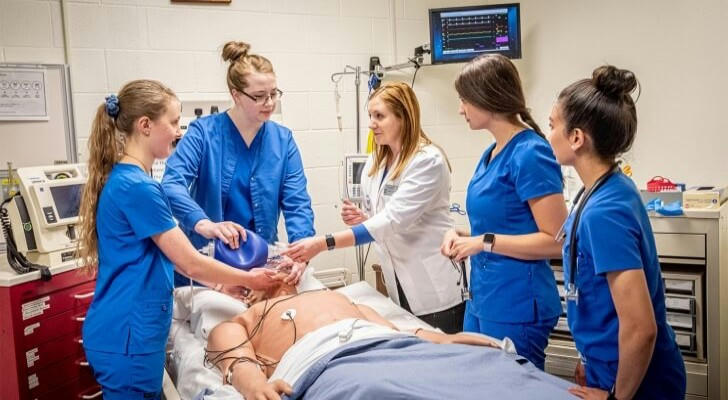Caring for Others: Exploring Nursing Careers
Nursing stands as a cornerstone of the healthcare system in the United States, with nurses serving as dedicated advocates and caregivers for individuals across all walks of life. Their role extends far beyond simply administering medication; nurses provide crucial emotional support, educate patients and their families, and play a vital part in the overall healing process. The American Nurses Association (ANA) emphasizes the ethical obligations and high standards that guide nursing practice. For those considering a career that combines scientific knowledge with a profound sense of purpose, the diverse world of nursing offers a multitude of rewarding opportunities 👍. Let's explore some of them.

The Heart of Healthcare: Compassion and Expertise ❤️
At its core, nursing is driven by a deep sense of compassion and a genuine desire to help others 🤗. It requires not only the ability to perform complex medical tasks but also the emotional intelligence to connect with patients on a human level. Nurses are often the first point of contact for patients and their families, providing comfort, reassurance, and clear communication during times of vulnerability. They must be empathetic listeners, understanding the anxieties and fears that often accompany illness. Moreover, nurses are highly responsible individuals, entrusted with the critical task of ensuring patient safety, administering treatments accurately, and adhering to strict medical protocols. The ability to remain calm and focused under pressure, coupled with unwavering patience, are essential qualities for success in this demanding yet fulfilling profession. The National League for Nursing (NLN), dedicated to excellence in nursing education, recognizes that cultivating these humanistic qualities is just as important as developing clinical skills.
A Landscape of Nursing Roles 💼
The nursing field offers a diverse range of career paths, allowing individuals to specialize in areas that align with their interests and skills. Here are some common nursing roles in the US:
Registered Nurse (RN): Registered Nurses form the largest segment of the nursing workforce. They are the primary caregivers, responsible for the holistic well-being of their patients. This involves conducting thorough assessments 🩺, developing individualized nursing care plans, administering medications and treatments, and providing crucial education to patients and their families on managing their health 🍎. RNs work in various settings, including hospitals 🏥, clinics, private medical practices, and nursing homes 🏡. According to the Bureau of Labor Statistics (BLS), the employment of registered nurses is projected to grow 6 percent from 2022 to 2032, about as fast as the average for all occupations. This growth is driven by factors such as an aging population and increasing rates of chronic conditions. To become an RN, individuals typically need an Associate's or Bachelor's degree in Nursing and must pass the NCLEX-RN, the national licensure examination administered by the National Council of State Boards of Nursing (NCSBN).
Case Example: Sarah, an RN in a hospital's cardiac unit, provides comprehensive care for Mr. Johnson post-heart attack. She monitors his vital signs, manages his medication, educates his family, and coordinates his care with the medical team.
Licensed Practical Nurse (LPN) / Licensed Vocational Nurse (LVN): Working under the direction of RNs and physicians, LPNs/LVNs provide essential basic nursing care. Their duties often involve monitoring vital signs, assisting with daily activities, applying bandages, and administering certain medications. They are crucial in hospitals, nursing homes, and for patients receiving care at home. The BLS also anticipates favorable job prospects, projecting a 5 percent growth in employment for licensed practical and licensed vocational nurses from 2022 to 2032. To become one, you need to complete a state-approved program and pass the NCLEX-PN from the NCSBN.
Case Example: David, an LPN at a nursing home, provides daily support to residents like Mrs. Rodriguez, assisting with her routines and ensuring her comfort.

Advanced Practice Registered Nurse (APRN): APRNs have advanced education and specialized clinical training, allowing them to take on more complex roles. The American Association of Nurse Practitioners (AANP) highlights that NPs manage nearly 74% of their patients' medication needs and are crucial in expanding access to healthcare.
- Nurse Practitioner (NP): Nurse Practitioners can diagnose and manage a wide range of health conditions, often serving as primary care providers 🧑⚕️.
- Clinical Nurse Specialist (CNS): CNSs are experts in specific nursing specialties.
- Certified Nurse-Midwife (CNM): CNMs provide comprehensive care during pregnancy and childbirth. The American College of Nurse-Midwives (ACNM) reports that CNMs attend over 10% of all births in the United States.
- Certified Registered Nurse Anesthetist (CRNA): CRNAs administer anesthesia. The American Association of Nurse Anesthetists (AANA) emphasizes that CRNAs safely administer more than 50 million anesthetics to patients each year in the United States.
Case Example: Maria, a Family Nurse Practitioner at a community health clinic, provides essential primary care services. She recently diagnosed and treated a young mother.
Nurse Manager: Experienced nurses can advance into leadership positions.
Nurse Educator: These nurses teach and mentor the next generation of nurses. The NLN provides valuable resources.
Nurse Researcher: These nurses conduct studies to advance the science of nursing. The National Institute of Nursing Research (NINR) supports this critical work.
Travel Nurse: For nurses seeking adventure, travel nursing offers the opportunity to work in various healthcare facilities.

Thinking About a Nursing Career? 🤔
Choosing a career in nursing is a commitment to making a real difference. While demanding, it offers immense personal and professional rewards 🎉. The ANA emphasizes the deep sense of satisfaction that comes from knowing you have positively impacted someone's health.
The demand for skilled nurses remains high 🌟. The Centers for Disease Control and Prevention (CDC) highlights the increasing healthcare needs of an aging population and the rising prevalence of chronic diseases, further underscoring the critical role of nurses in the healthcare system. If you have a genuine desire to care for others and an interest in health ⚕️, nursing could be a truly rewarding decision.
In Conclusion 🎉
The field of nursing is a vital component of the US healthcare system, offering a multitude of career paths. It’s a profession that values both skill and heart ❤️. If you are looking for a career where you can make a tangible and meaningful difference ✨, consider the diverse world of nursing.
